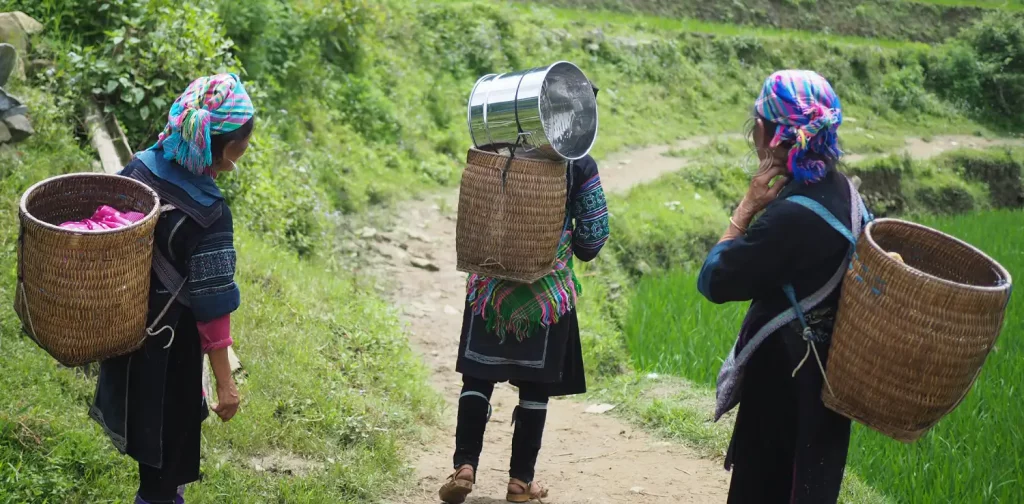Improving Gender Mainstreaming in Laos’s Climate Change and Agriculture Policy

Photo by Ivesh on Unsplash.
Agriculture plays a significant role in Laos’s economic development. It is estimated that over 80% of the population depends on the agriculture sector and natural resources. Although agriculture is the most sought-after industry, it is highly vulnerable to poverty and climate change due to geographic conditions and the lack of infrastructure development.
Lao Women in Agriculture
In Laos, women have substantial responsibility in agriculture production. However, they are also the most significantly impacted by its vulnerabilities. Oxfam discovered that in rural areas, women have a lower literacy rate than men and are less likely to lead and make decisions regarding households, agriculture, and rural development.
Thus, protecting women groups in agriculture through gender-responsive policy making is fundamental to avoiding livelihood threats such as food insecurity, infectious disease, and poverty. This move would also boost women’s access to land, resources, and credit. Unfortunately, Laos doesn’t have this yet.
Laos’s Gender-Responsive Climate Change and Agriculture Policy
Published in 2019, Laos’s Decree on Climate Change doesn’t cover gender equality. This decree focuses on monitoring and evaluation techniques, which are not reflected in human rights. Laos’s Environmental Protection Law also does not refer to women participating in the decision-making process.
Overall, Laos’s climate change and agriculture policies have yet to encourage women’s protection, such as social inclusion, land rights access, and anti-discrimination. Without adequate legal protection, women are vulnerable in the face of climate change and natural disasters that highly affect the agriculture sector.
Recommendations for Law Remediation
The existence of law is to integrate the national development framework, which provides a foundation to ensure fundamental rights, policies, and behaviors at any level. So, creating gender-responsive policies for climate change and agriculture development in Lao PDR is necessary to reduce social gaps experienced by women groups.
Asian Development Bank recommends three areas of law to support gender mainstreaming in climate change mitigation and agriculture development in Laos:
- Encouraging public participation by women groups in the National Strategy on Climate Change
- Setting precise measurements of women’s resilience in disaster management law
- Strengthening the inclusivity of land and agriculture rights to ensure women’s access to land
Lao women play an important role in climate change mitigation and agriculture development. Thus, it is crucial to protect their rights through the gender mainstreaming of climate change and agriculture law. By reducing social inequality, gender-responsive policies would help combat issues such as malnutrition, extreme poverty, and food insecurity.
Editor: Nazalea Kusuma
Nor Anisa
Anisa is a Reporter at Green Network Asia. She graduated from Mulawarman University with a bachelor's degree in International Relations. She is a part of the YSEALI Academic Fellowship on Environmental Issues and Natural Resources Management at East West Center.

 Test Custom Feature Image
Test Custom Feature Image  Electric Vehicles Roam the Roads of Kenya
Electric Vehicles Roam the Roads of Kenya  FedEx Engages Employees with Beach Clean-Up Initiative
FedEx Engages Employees with Beach Clean-Up Initiative  Come Back Stronger: Building Philippines’ Resilient Economy Post-COVID-19
Come Back Stronger: Building Philippines’ Resilient Economy Post-COVID-19  Inside Experian’s Sustainability Journey: An Interview with Chief Sustainability Officer Abigail Lovell
Inside Experian’s Sustainability Journey: An Interview with Chief Sustainability Officer Abigail Lovell  5 Food System Actors That Have Taken the 123 Pledge to Reduce Food Loss & Waste
5 Food System Actors That Have Taken the 123 Pledge to Reduce Food Loss & Waste  Test premium post
Test premium post